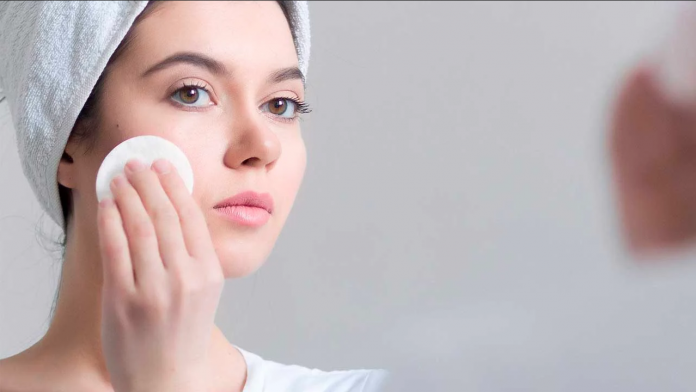Our skin, like all mammals, is covered with small oil-producing glands called sebaceous glands. These sebaceous glands produce a fatty substance called sebum (a complex mix of lipids) which is extremely important as it helps keep the skin lubricated as well as protected. When the sebum produced is more than the required amount, it leads to oily skin, also known as seborrhea.
Here are a few ways to treat oily skin:
a)Change your skincare regime:
Clearly, something isn’t quite right with your current skincare routine. If you don’t have a routine, make sure you define one that includes a cleanser, toner and moisturiser suitable for your skin type. Buy trusted and recommended brands to ensure your skin doesn’t react badly to the items. A patch test could confirm their suitability: try a small quantity of the products on your forearm and return in a day or two to purchase, or buy a smaller quantity to try it at home, note the results and then invest in it.
Some home remedies can also help to deal with oily skin. You can experiment with ingredients like aloe vera, honey, rose water, the juice of a lemon and fuller’s earth (multani mitti), depending on your skin type.
b)Question your makeup choices:
Makeup is an added layer on to your skin. The ingredients used in makeup can often cause harm to your skin. Be very picky about what you chose to apply to your skin.
Give your skin a few makeup-free days in the week, if possible – your skin will get to breathe and your pores will catch a much-needed break. If going makeup-free isn’t possible, consider minimizing the risk by reducing the number of products as well as the period of time for which you keep it on. Make sure to clean your makeup tools and brushes regularly and thoroughly.
c)Drink more water and remove trigger foods:
Drinking an adequate amount of water can work wonders for your skin. If your acne is caused by dehydration, make a conscious effort to increase your water intake. If you notice that indulging in certain foods causes a change in your skin (a food diary can help you track this), remove those foods from your diet plan.
d)Consult a dermatologist:
A professional will always be able to guide you better when it comes to your skin. The recommendation can be anything from topical treatments like retinoids to medications like oral contraceptives and therapies that involve lasers.
Prevention of oily skin:
A few steps that can be taken to prevent oily skin are:
a)Wash your face correctly:
Over-washing of the face can promote oily skin. Use lukewarm water to wash your face twice a day, pat dry with a towel or let it dry naturally. Rubbing your face with the towel is not advised. Make sure to wash your face before going to bed to remove all the dirt and makeup residue. Use a toner to keep your pores clean.
b)Maintain a healthy diet and lifestyle:
Hydration is essential – not only for healthy skin but for many other health aspects as well. Avoid greasy and packaged food and also foods that have a high GI (glycaemic index).
A stressful lifestyle can also lead to excess sebum production. Make sure to manage stress if you feel things getting out of hand and get adequate sleep every night.
c)Use the right makeup and skincare:
Moisturize. Yes, it might seem counterintuitive, but it isn’t. A good quality moisturizer for oily skin will contain ingredients that will help control sebum production. Always test products to check for suitability, though – whether skincare or makeup. Discontinue use if it causes a reaction, and try a different brand. Certain makeup products are oil based and should be avoided in favor of water-based items. Make sure to invest in a good makeup remover and use it regularly to clean your face when you get home.



























